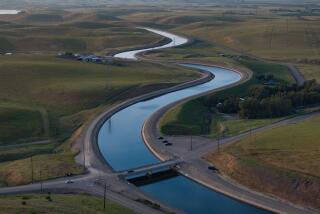Rice Deals, Water Deals, Dirty Deals
- Share via
LOS ANGELES — Let me start by throwing out two numbers.
The first is the total amount of water scheduled to be shipped--as of last week--to all of Southern California by the State Water Project for 1991.
That figure: 900,000 acre-feet.
On Monday, that number was revised to zero. The governor made the announcement, citing a downward spiral in the drought.
The second figure is the amount of water that was scheduled to be shipped this year to a group of rice farmers, cotton growers and others who hold special contracts with the state and federal governments.
That number: 2.6 million acre-feet.
This second number was not reduced to zero on Monday. It was not reduced at all.
Let’s say quickly that most farmers in the state do not fall into this special group. Most farmers, in fact, have been cut to the breaking point, or close to it.
That makes this special group all the more intriguing. To understand how they arrived at a status that seems to make them exempt from the drought, you need some background. So bear with me for a moment, I’ll make this as painless as possible.
Way back, before the huge federal and state reservoir projects were built, a few farmers held water rights along the state’s major rivers. One group was clustered along the Sacramento River, another along the San Joaquin, and a third along the Feather.
When the feds and the state proposed their projects--which would take control of the rivers--they had to deal with these old rights held by the farmers. The two sides negotiated and the farmers eventually relinquished their rights in exchange for contracts that gave them special guarantees to water from the projects.
That’s why, when the state cut most farmers to zero in January, it continued to supply the Feather River farmers with 60% of their demand, or about 600,000 acre-feet.
And that’s why, when the feds cut their farmers to a 25% allocation a few days ago, they let the Sacramento and San Joaquin groups keep 75%. That 75% will amount to 2 million cre-feet this year.
The mystery is this: In a drought that grows more threatening every day, that could grind the California economy to the nubs, that could literally deprive some cities of drinking water, why do these contracts remain so sacred?
That 2.6 million acre-feet is more than all the water originally requested from the State Water Project for Southern California this year. It represents that last cushion of water reserves in storage. If that buffer goes, and the rains fail to come early this fall, we could hear a dry rattle in taps all over the state.
And this risk is being taken so the farmers can raise crops that are mostly listed by the government as surplus.
Last week, Rep. George Miller, the Democrat from Martinez and vice chairman of the House Interior Committee, wrote to Secretary of Interior Manuel Lujan asking him to enforce provisions of the federal contracts that allow the government to suspend deliveries to the farmers in the event of “acts of God or . . . any cause beyond the control of the respective parties.”
The secretary declined.
Then on Monday, our new governor was asked what he planned to do about the special contracts. The governor waffled some, but basically his answer was, “Nothing.”
He then reminded reporters that the fat deliveries going to the rice farmers will play a major role in the Administration’s so-called “water banking program.”
The water banking program is a system where the haves sell their water to the have-nots. So here’s what the governor is suggesting: The rice farmers will be permitted to buy water at $2 to $4 an acre-foot--the contract price--and sell it to the rest of us for estimates that range from $250 to $1,000 per acre-foot.
The numbers that flow from this arrangement are impressive. If 600,000 acre-feet are purchased at a price of $500 each, the total comes to $300 million.
Keep in mind that this water is stored behind dams built at taxpayer expense. Keep in mind that the contracts--the same ones that allow deliveries to be suspended--also declare the government immune from damages from such suspensions.
So someone please tell me: why are our governments wheeling the last water in California to rice farmers so they can become millionaires off the drought?
More to Read
Sign up for Essential California
The most important California stories and recommendations in your inbox every morning.
You may occasionally receive promotional content from the Los Angeles Times.









